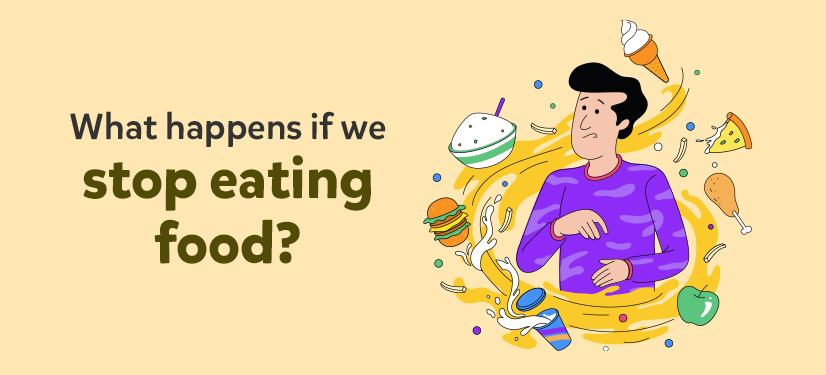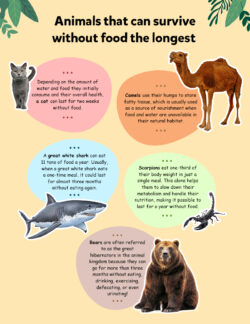
Be it the fictional survival hero Robinson Crusoe or the very real Bear Grylls, people who attempt to survive in the toughest terrains always remember to do one thing — they eat. Often, it is whatever they get in their surroundings. Sometimes it might even include strange plants or fungi or even involve hunting animals. Have you ever thought why they do what they do? It is because human beings cannot survive for more than 21 days at a stretch without food.
Food and water consumption is integral to human life. Your body will stop working eventually if you stop consuming both food and water. However, we can survive for days without water and sometimes weeks without food. The time period varies depending on whether you stop consuming just food or whether it’s both water and food. When you are starving, the body starts to function differently in order to reduce the amount of energy it burns.
An article in PubMed, a free full-text archive of biomedical and life sciences journal at the US Library of Medicine, states the body can survive for as long as 8 to 21 days without food and water And even up to two months if there’s access to an adequate water intake. Several other studies have uncovered significant observations about starvation.
Modern-day hunger strikes around the world have provided an insight into starvation. A study in the British Medical Journal cited several hunger strikes that ended after 21 to 40 days, which came to an end because of the severe, life-threatening symptoms the participants were experiencing.
Experts have also said to have found a certain “minimum” number on the body mass index (BMI) scale for survival. According to the journal Nutrition, men with a BMI of less than 13 and women with a BMI of less than 11 cannot survive. Another article in the British Medical Journal stated that those who are of normal weight and have a healthy BMI tend to lose a higher percentage of their body weight and muscle tissue much quicker than those who are obese during the first three days of starvation. According to the journal Nutrition, a woman can withstand starvation much longer compared to men due to their body composition. However, there is no hard and fast rule for how long a human being can live without food.
According to a report by BBC, Catherine Collins, spokeswoman for the British Dietetics Association explained that “the body can remodel during starvation to minimise the amount of calories it needs.”
When the human body stops getting the food it requires each day, it has to live on stored sugars. The liver and muscles store glucose — the primary fuel source for the body — as glycogen. This glycogen can then be converted into glucose when our bodies don’t receive adequate food. It takes around eight hours without the consumption of food for your body to change how it operates. Before that, it functions just like you were eating regularly.
Whenever this runs out, fat is then converted into a secondary energy supply called ketone bodies. After the fat runs out, Collins states that the “body must take recycled protein from the system and eventually from the muscles to convert it to energy. But this is very expensive fuel for the body because it’s wasting important tissue reserves. It’s like being in a cold house and burning Chippendale furniture instead of firewood.”
In order to prevent excessive muscle loss, our body begins to rely on fat stores to create ketones for energy, a process known as ketosis. People might experience significant weight loss during this time. One of the reasons why women are able to sustain starvation longer than men is that their bodies have a higher fat composition. During starvation, women are also able to hold on to protein and lean muscle tissue much better compared to men.

Despite your ability to continue or survive without food and water for days or weeks, your body will be affected and it might have an impact on your overall health.
Some of the side effects of starvation include:
Those who starve for a prolonged time can’t begin to consume normal amounts of food immediately. The body needs to be gradually eased into eating again to avoid adverse reactions, commonly known as refeeding syndrome, whose effects include:
Finally, we can say that a human being can survive for days or even weeks without food but eventually starvation leads to death. Hence, to live a healthy life one must consume the right amount of food regularly and drink ample amounts of water.
Have you ever tried fasting for a day or more? How long could you go without food? Tell us in the comments below.
Enjoyed reading this? Then visit our The Learning Tree blog to check these out:
What Is So Special About The Metric System?
Writing has always been Shreesha’s passion, be it for imparting knowledge or expressing opinions. In her former role as a journalist, she contributed to enriching society with knowledge. Now, at BYJU’S, she has moved on to something more exciting – creating tailor-made content for students. When she is not writing, you would find her looking for new ways to engage her child.